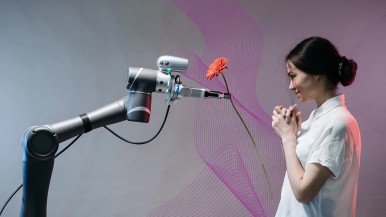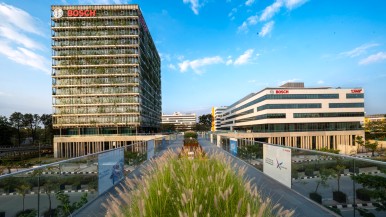Bengaluru – Bosch Limited, a leading global supplier of technology and services, ended its fiscal year 2020-21 with a total revenue from operations of INR 9,718 crores (1.12 billion euros), thus registering only a marginal decline of 1.3 percent compared to the previous fiscal year. Profit Before Tax (PBT) before exceptional items declined by 19.9 percent to INR 1,311 crores. PBT before exceptional items in FY 2020-21 thus amounted to 13.5 percent of total revenue from operations. “Despite facing a spell of near-zero sales in the month of April and May in 2020, there has been a significant increase in the demand from the agriculture sector, mainly the tractor business. Industry showed continued signs of recovery since the second quarter of FY 2020-21, however, it remains impacted due the uncertainties in the market. International market volatilities in the supply chain will also continue to impact the auto sector. Furthermore, we have seen growth in the Power Tools segment, especially in the construction and e-commerce sectors,” said Soumitra Bhattacharya, Managing Director, Bosch Limited and President of Bosch India.
During the FY 2020-21, Bosch Limited made a provision of INR 743.8 crores, towards various restructuring, reskilling and redeployment initiatives. These provisions have helped us in transforming the company and making it future-ready. The PBT after exceptional items stood at INR 567 crores, or 5.8 percent of total revenue from operations. Profit After Tax (PAT) stood at INR 482 crores. PAT before exceptional item stood at 10.7 percent of total revenue from operations. Total investments in 2020-21 amounted to INR 246 crores with major spend on the expansion of our Adugodi campus into a smart campus.
Results in Quarter 4 of FY 2020-21
In the quarter ending on March 31, 2021, – Quarter 4 of FY 2020-21 – Bosch Limited posted a total revenue from operations of INR 3,218 crores, thus registering an increase of 43.8 percent compared to the corresponding quarter in 2020. PBT for the current quarter stood at INR 640 crores, 77.2 percent increase over the same period of previous year.
“India is witnessing an alarming spike in COVID-19 cases in the second wave of the pandemic. While the central and state governments are doing their bit to accelerate the vaccination drives and ensure the safety of its citizens, we must act responsibly by following the guidelines set by them. The welfare of our employees and people around us is a priority for Bosch. Apart from converting our sports complex into a COVID Care Center for BBMP, donating close to four million medical grade masks to frontline workers and giving free vaccination to all our staff and their dependents, we are also investing in an in-house oxygen generation unit for business purposes as well as an aid to healthcare infrastructure.” added Bhattacharya.
Total revenue of Bosch Limited’s Mobility Solutions Business sector increased by 56.6 percent in the quarter ending on March 31, 2021. Within this business sector, total revenue of the Powertrain Solutions division increased by 65.6 percent. The Two-Wheeler and Powersports along with Automotive Aftermarket witnessed a continued growth during the quarter.
Business development in FY 2020-21
Bosch Limited’s Mobility Solutions business sector increased by 2.4 percent in 2020-21, amidst lockdown in April and part of May 2020. Domestic sales increased by 1.2 percent. Within the Mobility Solutions sector, the Powertrain Solutions division registered an increase of 1.8 percent owing reasons mentioned above. Business beyond Mobility solutions has recorded a decline of 11.7 percent. Considering the company’s performance, the Board of Directors recommended a dividend of INR 115 per share for this twelve-month period.
Bosch Limited: Outlook for fiscal year 2021-22
Speaking about the outlook for the upcoming fiscal year, Bhattacharya commented: “The auto industry was seeing itself on a road of recovery until early this year and Bosch Limited’s positive results is a validation to it. However, with the second wave being more severe, there is a clear uncertainty in the market. With 80 percent of our revenues driven through mobility business, we have been affected adversely. The challenge will be to manage the fluctuating demand, supply chain crisis and changing consumer behavior all at once.”
Bosch has a long-term strategy to shape the market in key technologies with innovative products and solutions. Bosch Limited thus continues its stance to be a technology agnostic partner to customers, government, and other stakeholders. While we have successfully managed the transition from BS IV to BS VI, next challenge will be transitioning to TREM 4 and 5, adoption of CAFE norms phase 2 and BS VI stage 2. Amidst the crisis, Bosch in India will continue with the investments in competence development in addition to the solutions designed and developed in India and for India. For all Bosch businesses beyond Mobility Solutions, the company has a two-pronged approach. On one hand, Bosch continues to bring-in ‘Fit for market’ products and solutions while on the other, the company will increase its ‘Go to Market’ footprint using both offline and digital platforms. Scaling up E-commerce activities will remain one of the key initiatives in FY2021-22.
Bosch Group: Outlook for 2021 and strategic course
The Bosch Group achieved a positive result in 2020 despite the coronavirus pandemic and had a successful start to the first quarter of 2021. "Bosch came through the first year of the coronavirus pandemic well," said Dr. Volkmar Denner, the chairman of the board of management of Robert Bosch GmbH. However, the company expects another challenging year, primarily due to ongoing pandemic risks. To develop new business opportunities on the back of the profound technological and ecological changes currently occurring, Bosch is combining the internet of things (IoT) with artificial intelligence (AI) and is concentrating on electromobility. “We are one of the winners in the transition to electromobility, and we are significantly expanding our software business by tying in artificial intelligence,” said Denner.
Global efforts to combat climate change are boosting electrification and green hydrogen. Electrification offers Bosch new opportunities in several business areas, since it requires solutions not only for electric driving in cars, but also for electric heating in buildings. In powertrain technology, electromobility is establishing itself as Bosch’s core business. Fuel cells convert hydrogen into electricity, and Bosch is developing both stationary and mobile fuel-cell solutions. From 2021 to 2024, Bosch plans to invest one billion euros in fuel-cell technology.
Bosch is pressing ahead with its own climate action targets as planned, and has reached a major milestone with the climate-neutral status of its more than 400 locations worldwide in spring 2020. This has already been confirmed by independent testing. As a result, Bosch is the first global industrial company whose own locations no longer leave a carbon footprint – this also includes the sites in India. Bosch also aims to reduce CO₂ emissions along its entire value chain, from suppliers to customers, by 15 percent by 2030 from their 2018 level – a reduction of 67 million metric tons of carbon dioxide emissions.





